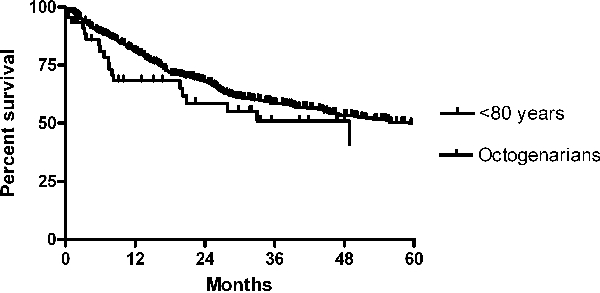Background:Due to changes in life expectancy there are an increasing number of elderly patients with esophageal cancer. The aim of this study was to assess the outcome of esophagectomy for cancer in patients 80 years or older.Methods:Retrospective review of the records of all patients who underwent esophagectomy for cancer from 1992 to 2007. A cardiac and pulmonary evaluation was obtained on individual basis in the younger patients, and in all octogenarians.Results:Among 558 patients with esophagectomy for cancer 45 (8%) were octogenarians. The median age of the younger group (n=513) was 63 years (IQR 56-71). Octogenarians had significantly more Stage III disease (49% vs. 31%, p=0.0152) but received less neoadjuvant therapy than younger patients (2% vs. 21%, p=0.0020). In octogenarians the transhiatal resection was more common than in the younger group (77% vs. 36%, p<0.0001). Symptoms and weight loss prior to surgery were similar in both groups, but BMI was significantly lower in octogenarians (25 vs. 28, p=0.0002). There was no difference between the two groups regarding major or minor complications (p=0.8222, p=0.2830) as well as reoperation rate (16 vs. 19%, p=0.6210). The median postoperative hospital stay was similar at 16 days (p=0.6854). Hospital mortality was 9% for octogenarians vs. 4% in the younger group (p=0.1335). Cancer related survival was similar (48.9 vs. 59.3 months, p=0.3107; Figure 1).Conclusion:Esophagectomy can be safely performed in carefully selected octogenarians with good cardiac and pulmonary function. Patients should not be denied an esophagectomy based only on their age.
Figure 1: Cancer related Survival
 500 Cummings Center
500 Cummings Center +1 978-927-8330
+1 978-927-8330
 +1 978-524-0461
+1 978-524-0461